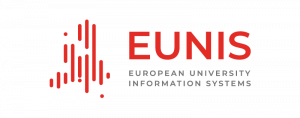Minutes of the general assembly
28th June 2007, Grenoble, France
The annual meeting of the EUNIS General Assembly took place during the EUNIS2007 Conference in Grenoble, France on 27 June 2007.
Present:
The President (Jean-François Desnos) took the chair. There were more than 30 member representatives and guests present.
1. Welcome and Registration of Representatives
The President welcomed new colleagues to their first meeting of the EUNIS General Assembly. Representatives of member institutions and organisations registered their presence at the meeting.
2. Report on EUNIS activities 2006-7
The Executive Secretary (Martin Price) led a review of EUNIS activities during the past year.
There were now 121 paid up members of EUNIS from 25 countries. Membership had increased by 23% in 2006-7.
The Chair of the EUNIS E-Learning Task Force (Andrew Rothery) spoke about the launch workshop of the Task Force which had taken place in Birmingham in November 2006. At the Workshop 20 members from 9 countries enthusiastically discussed plans for future ELTF activities, and 5 subgroups were formed to undertake the following activities:
- E-Learning Snapshots
- Jens Dørup Award for E-Learning
- E-Learning case studies
- Bids for EC funding
- The future of E-Learning
At last year’s General Assembly it was announced that a joint bid for funding from the EC Socrates Programme had been made by EUNIS, EUA, CSIESR, UCISA and ZKI. The bid was unsuccessful. However, EUNIS was continuing to work as an external partner of the UK’s JISCinfoNet project on the Bologna Process. Martin Price had attended the project’s launch workshop in Dublin in May 2007.
EUNIS continues to collaborate with bodies with similar interests, including 10 national organizations in European countries. The President and Executive Secretary had attended a meeting of ZKI in Dortmund, Germany in February 2007, where the President gave a presentation about EUNIS.
It had been announced n the 2006 report to the General Assembly that EUNIS was contributing to the EARNEST Foresight Study led by TERENA. Martin Price is co-chairing the sub-study on Campus Issues. Jean-Francois Desnos, Rogelio Montanana, Michael Nowlan, Ligia Ribeiro and Martin Sutter are also working on the sub-study.
Competition for the eighth EUNIS Elite Award for Excellence had recently taken place. SAP had kindly agreed to donate the €2000 prize again. The winner would be identified at the end of EUNIS2008. At the same time it would be announced that a competition for the Jens Dørup Award for E-Learning will be held in 2008, with the first Award made, appropriately, at Jens’ home university of Århus.
The revised EUNIS web site was introduced in 2006-7.
3. Financial Report
The Treasurer (Markku Kuula) presented the EUNIS Accounts for 2006-7, which showed an increase in the overall balance to €101, 845.68 on 22 June 2007. The General Assembly formally approved the accounts.
The Treasurer also presented a proposed Budget for 2007-8, which would give a projected surplus of €129,746 in June 2008. The General Assembly approved the proposed Budget for 2007-8.
The Treasurer reported there would be no change in the annual membership fees for the year beginning 1 September 2007.
4. Future conferences
- Aarhus, Denmark, 24-27 June
- Santiago de Compostela, Spain
- Warsaw, Poland
5. Ideas for future activities
The President reminded members that the Board was always pleased to discuss proposals for EUNIS activities, and would be particularly interested in ideas for multi-national projects.
6. Possible changes to Statutes
The General Assembly was asked to suggest ideas for improving the organisational structure of EUNIS. The Board recognised that the present structure was too complicated and wished to find a way to make it simpler without sacrificing the essential qualities of the association. Ivan Vrana had proposed a radical change to reduce the organisational structure from 3 layers of General Assembly(GA)-Council-Board to 2 layers of GA-Board, with members of the GA electing the Board of Directors. Two major concerns emerged:
that EUNIS should not risk losing its effective links with national organisations in the 10 countries where they currently existed.
that its structure should not allow EUNIS to become dominated by the larger countries. All tiers of management in EUNIS should be as broadly based as possible.
7. Elections to Council
The following were elected to the EUNIS Council to represent their respective constituencies.
National Organisations ‘Chambers’
Spain Miguel FerrandoI
Institutions ‘Chambers’
Germany Uwe Blotevogel
Ireland Gordon Young
Spain Javier Franco
Martin Price , EUNIS Executive Secretary 10.7.2007
